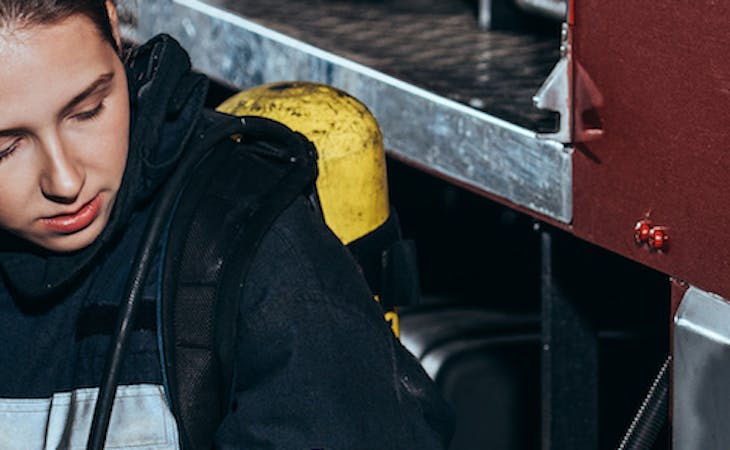It was already tough before the pandemic for on-duty first responders to get a good night’s sleep. The nature of their work—whether emergency medical personnel, firefighters, members of the military, or law enforcement officers—puts them front and center at emergencies and disasters. Besides the stressful work, long and varying shifts and odd hours can impact their sleep.
It’s more challenging than ever these days, as first responders help maintain the frontlines of the battle against the coronavirus on top of their regular responsibilities. And when your job requires alertness and sharp thinking, getting adequate sleep can make the difference between a successful assignment and an accident—or worse.
First responders and sleep deprivation
A study published in the Journal of Emergency Medical Services found that 80% of the 1,843 firefighters and EMS study participants reported getting less than seven hours of sleep per day, compared to 35% of the general population. Almost 29% said they wake up feeling exhausted four or more days per week. Approximately 30% reported a sleep disorder diagnosis, and only about half rated their sleep quality as “good” or “very good.”
That sleep deprivation can have serious consequences.
A major study by the International Fire Chiefs Association examined the effects of sleep deprivation on firefighters and emergency medical personnel. It found that sleep deprivation is associated with increased errors in tasks requiring alertness, vigilance, and quick decision-making. Long work hours can also lead to chronic sleep loss, which can reduce clear thinking and cause depression, stress, and irritability.
“You kind of sleep on edge,” says Shawna Hahn, a full-time firefighter and paramedic for nearly 20 years with three different fire stations in western Virginia: Amissville Fire and Rescue, North Mountain Fire and Rescue Company, and Warrenton Volunteer Fire Company. “I sleep kind of anxiously, expecting to get woken up.”
Besides radio traffic, one reason for sleeping on edge has been what Hahn describes as “the loud and obnoxious and startling” klaxon that traditionally would ring or blast out the signal to summon the first responders to a call. “It’s like a ship horn going off and the lights come on,” she says.
Hahn cites research showing that firefighters were having heart attacks because they were startled from a dead sleep to wide awakeness. Most of the old klaxons have been replaced in recent years by a series of tones that tell everyone in the station to get ready to roll. Hahn describes the tones as a “kinder and gentler” way to be awakened for a call.
Besides her firefighting and paramedic duties, Hahn, like many other first responders during the COVID-19 pandemic, is helping to administer vaccines. The day before our phone interview, she was at the station for five or six hours getting needles into arms—600 that day, 1,500 the previous weekend.
If she isn’t busy enough with her professional work, Hahn is the mom of spunky little Rory and is working on a master’s degree in business management with a concentration in emergency management. How, you might wonder, does she get any sleep at all? “We still have to live a life,” she says, adding, “By the time I get to bed, I fall asleep as soon as I hit the bed.”
Related: 6 tips to help nurses get better sleep
Tips to help first responders get better sleep
I asked Hahn for a few pointers she could offer to other first responders trying to get the rest they need to be their best at work. Here’s what she suggests:
- Lay out your gear before you sleep so it’s ready when you need it. “Set yourself up so you’re not scrambling,” says Hahn.
- Outfit your sleeping space to your needs. Use a mattress pad or heated blanket if you like. “Don’t be afraid to tailor your space,” says Hahn.
- Use a fan or white noise machine. This is helpful to dampen the noise in the station.
- Make sure your cell phone is charged. “Depending on the system, you may get the alert on your phone before you hear the tones,” says Hahn.
Nick Holderbaum, a full-time firefighter and paramedic, offers recommendations in an article for EMS World titled “The First Responder’s Ultimate Guide to Sleep.” Here are a few of his tips:
- Get 7-8 hours of sleep on your off days. This will help combat the negative effects of poor sleep on duty.
- Stop eating 2-3 hours before bed. This gives your body time to digest your last meal and to prevent spikes in cortisol (the stress hormone).
- Create a cool (65 degrees Fahrenheit is optimal), dark sleep environment. This is the optimal setup for the bedroom, according to the National Sleep Foundation.
To honor the brave women and men who put themselves at risk to protect and serve all of us, Saatva proudly offers a year-round discount to EMTs, paramedics, 911 dispatchers, firefighters, and law enforcement officers. Learn about our discount for first responders and how it can help you achieve the sleep you need to perform your best on the job.




